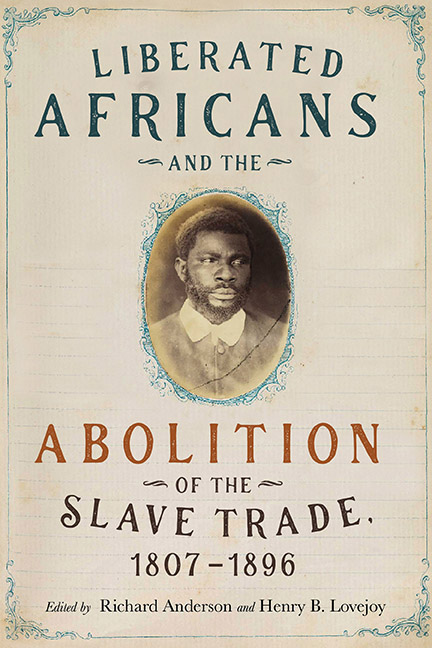Book contents
- Frontmatter
- Dedication
- Contents
- List of Illustrations
- Acknowledgments
- Introduction: “Liberated Africans” and Early International Courts of Humanitarian Effort
- Part One Origins of Liberated Africans
- Part Two Sierra Leone
- Part Three Caribbean
- Part Four Lusophone Atlantic
- Part Five Liberated Africans in Global Perspective
- Part Six Resettlements
- Bibliography
- Notes on Contributors
- Index
19 - Diaspora Consciousness, Historical Memory, and Culture in Liberated African Villages in Grenada, 1850s–2014
Published online by Cambridge University Press: 21 March 2020
- Frontmatter
- Dedication
- Contents
- List of Illustrations
- Acknowledgments
- Introduction: “Liberated Africans” and Early International Courts of Humanitarian Effort
- Part One Origins of Liberated Africans
- Part Two Sierra Leone
- Part Three Caribbean
- Part Four Lusophone Atlantic
- Part Five Liberated Africans in Global Perspective
- Part Six Resettlements
- Bibliography
- Notes on Contributors
- Index
Summary
On 25 January 1850, the Atlantic approached the harbor of St. George’s, Grenada's capital, a month after the landing of the Brandon and Ceres and ten months after the Clarendon. These four emigrant ships conveyed a total of 1,055 liberated Africans to Grenada via Sierra Leone and St. Helena. Overall, the island received 2,709 liberated Africans who were recaptured on illegal slave-trading vessels between 1836 and 1863. John Candler traveled throughout the British Caribbean in the 1850s to examine the results of emancipation on behalf of the British and Foreign Antislavery Society. He described the arrival of the Atlantic as a “touching” and memorable scene. Former recaptives, perhaps from one of the earlier emigrant ships, rowed Candler on a small boat toward the incoming vessel. He wrote that these boatmen conversed with the new arrivals on the Atlantic. Moreover, on the journey back to the shore, the boatmen and the new arrivals together “burst out into a cheerful African song.” Except for the Ceres, which departed from West-Central Africa via St. Helena, it is likely that the common language on these vessels was Yoruba. Thirty percent of recaptives on the Brandon were labeled as “Housas” (Hausa) and “Accoos” (Aku: Yoruba). While the ethnicities of Africans on the Atlantic and the Clarendon were not recorded, the Yoruba were well represented at liberated African reception depots and settlements in Sierra Leone during the mid-nineteenth century.
Recaptives sent to the island in 1849 and 1850 were indentured, mainly as plantation laborers. They were denied return journeys to Africa. Liberated Africans who migrated to British Guiana, Jamaica, and Trinidad via Sierra Leone during the early 1840s were eligible for free return passages. However, from 1848, return passages were no longer offered to liberated Africans who migrated to the British Caribbean. Thus, following their yearlong indenture, many of these liberated Africans in Grenada acquired land through purchase, rental, or squatting and formed several “independent settlements” around the island. However, unlike those in the Bahamas, Guyana, Jamaica, and Trinidad, little is known about liberated Africans in Grenada and the historical memories and cultural traditions within their settlements.
- Type
- Chapter
- Information
- Publisher: Boydell & BrewerPrint publication year: 2020



